Israel's Ex-Security Adviser Says Ukraine Crisis Can Speed Up Iran Deal
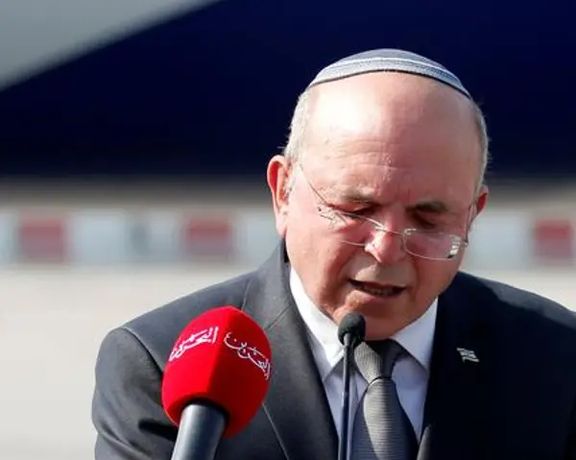
Israel's former national security adviser says the Russian invasion of Ukraine can spark a rush to conclude the deal between Iran and world powers.

Israel's former national security adviser says the Russian invasion of Ukraine can spark a rush to conclude the deal between Iran and world powers.
Meir Ben-Shabbat, top Benjamin Netanyahu’s aide and Chief of Staff for National Security, says with the Ukraine crisis into its fifth day, the world’s attention as well as that of Israel has been focused on Eastern Europe, which can enable Tehran “to take advantage of the global tumult in order to make progress on the nuclear program and other areas”.
In an interview with the Times of Israelin Hebrew published on Monday, he described Iran’s nuclear program as a far more direct threat to Israel’s security, expressing concerns that “it looks like they are very close” to an agreement in Vienna.
“There could be effects in both directions”, he said, noting, “On the one hand, it could get in the way of the rush toward an agreement, because of the difficulty of bringing representatives to sign the agreement during this time. On the other hand, it could lead to the mistaken conclusion that a deal must be signed quickly in order to remove this issue from the agenda and to focus on the crisis in Europe”.
Some Iranian politicians also expressed cautious optimismthat the Russian invasion of Ukraine might speed up a nuclear deal between Tehran and Washington.
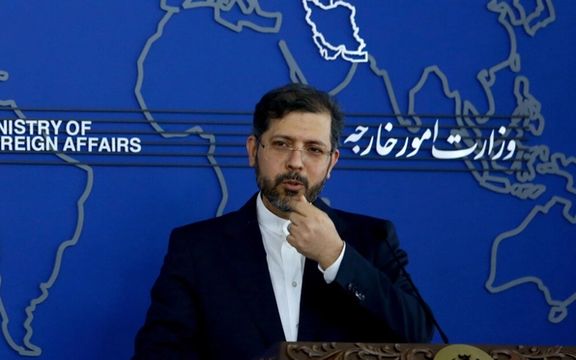
A draft agreement is “97-98 percent ready” in Vienna to revive the 2015 nuclear agreement, Iran’s foreign ministry spokesman said Monday in a press briefing.
Saeed Khatibzadeh acknowledged for the first time that a draft agreement between the two sides is ready, although earlier Tehran had dismissed a Reuters report quoting other sources about the existence of such a document.
Khatibzadeh did not mention what the remaining 2 or 3 percent of problems are, but both Iran and the United States in recent days had emphasized that important and serious issues remain unresolved.
Iran’s spokesman reiterated that the West must resolve three key questions to reach a deal, according to ISNA news agency in Tehran.
"Reaching a good deal is possible ... three key issues still remain to be resolved. The US and European powers have not taken political decisions on these major issues," Khatibzadeh said.
The United States, United Kingdom, France and Germany negotiating in Vienna have said that they have submitted their final offer to Tehran, and it is up to the Iranian government to respond.
Iran International reported on Saturday that Washington has imposed an “immediate deadline” demanding a response from Tehran. Both Western and Iranian foreign ministry sources confirmed that the deadline set was a matter of days.
Top Iranian oficials held several national security meetings in recent days, but sources told Iran International that a major meeting on Friday where Supreme Leader Ali Khamenei was present ended inconclusively.
Khatibzadeh on Monday said that Iran’s chief negotiator Ali Bagheri-Kani has returned to Vienna to pursue the talks.
Bagheri Kani, who flew to Tehran last week for consultations with Iranian officials, will "pursue the negotiations with a clear agenda aimed at resolving" the remaining issues, IRNA said.
On Sunday Khatibzadeh said that Iran will not accept any deadline set by the West.
"Iran accepts no deadlines," Khatibzadeh said, in apparent reaction to media reports that the United States had set a deadline for the nuclear talks in the Austrian capital Vienna.
Iran has made clear it wants an end to the oil and banking sanctions that are hurting its economy, while insisting also on the lifting of human rights and terrorism-related curbs.
On Saturday, Iranian Foreign Minister Hossein Amirabdollahian said Tehran was ready to "immediately conclude" a deal in talks to revive its 2015 nuclear accord with world powers if Western powers show real will.
Ambirabdollahin is due on Tuesday to report to the Iranian parliament on the progress of the talks, local media said.
On Friday, a senior U.S. State Department official said negotiators had made significant progress in the past week or so on reviving the deal, but very tough issues remained.

A former Iranian minister has warned parliament against plans to restrict Internet access, pointing out Elon Musk’s Starlink satellite access offered to Ukrainians.
Addressing the hardliner lawmakers who are pushing for a bill to limit the internet in Iran, former communication minister Mohammad-Javad Azari-Jahromi said on Sunday that "The consequences of wrong policies are heavy. Wrong governance destroys the instruments of governance and regulation forever”.
He made the remarks in reaction to the activation of satellite internet constellation Starlink for the Ukrainians. Operated by Elon Musk’s company SpaceX, it provides internet access coverage to most of the Earth.
As Ukraine's internet service has been disrupted by Russia's invasion, Musk made the internet service available in Ukraine, saying that more terminals to use it are also on the way.
The SpaceX CEO made the move after being asked by a Ukrainian government official if SpaceX could provide more Starlink services to the country after Russian troops invaded Ukraine last week.
Azari-Jahromi added that “all the unusual limitations [by Iran] on Internet [access] are direct marketing for the next generation of satellite Internet”, quipping that “if you do not provide people with the right service, others will”.
Iranians were outraged after an ad hoc parliamentary committee approved the outlines of the controversial bill -- ironically entitled 'Legislation to Protect Cyberspace Users -- to restrict freedom of access to global Internet and popular social media platforms.
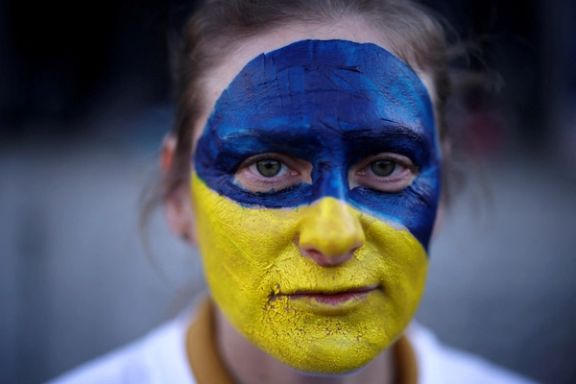
As debate about Russia’s invasion of Ukraine continues in Iran, divisions reflect the political dispositions of various factions over Tehran’s foreign policy.
Pro-Moscow positions are abundant in hardliner media outlets close to the core of the regime, such as Kayhan and Iran newspapers, while reformist daily Arman on Saturday and Sunday reflected anti-Russia views that normally do not find their way into the media.
Many ordinary Iranians and opponents of the Islamic Republic invariably support Ukraine and condemn the government pro-Russia policies on social media.
Other reformist media such as Sharq and Etemad newspapers carve out a position in between the two extremes. They often harshly criticize Moscow for its violation of international law, but invariably remind that the United States is no better when you look at its track record in places such as Afghanistan and the Middle east.
Reformists criticize President Ebrahim Raisi’s administration for tacitly blaming NATO and the United States for Russia’s actions, while also criticizing the US to remain politically correct given the regimes animosity toward Washington.
A good example of a reformist approach to the issue was reflected in an article in the Etemad daily by commentator Abbas Abdi who tried to strike a balance by blaming both Russia and the United States for the crisis in Ukraine. He said: "In the agreement about the nuclear disarmament of Ukraine and guaranteeing its territorial integrity in the 1990s, Russia undertook not to invade Ukraine and the agreement was also guaranteed by the United States. How responsible should a guarantor be?"
Abdi wrote in another part of the article: "Iranian hardliners say we should learn a lesson from this crisis in which the United States has not stood by its commitment [to Ukraine]. That is right. But don't Iran's hardliners want to take a lesson from Russia's behavior? Russia had guaranteed that no country would be allowed to invade Ukraine. I wish you take this lesson and rely on the people's support rather than relying on foreigners."
Abdi further wrote that Iran's position about Russia's invasion of Ukraine leaves the impression that it is not an independent state. He argued that Iran behaved in a way as if it had no other choice but to support Moscow. He hinted that Raisi’s supportive phone call to Vladimir Putin did not portray Iran as an independent country.
Abdi asked, "Why are we in such a position? We are in this position because of the same reason that Ukraine's president counted on the West in his confrontation with Russia. In the same way, Iran should not count on Russia or China in its confrontation with the West as they follow their own interests. And interests will push ethics and international commitments to the margins."
On the pro-Moscow front, Hossein Abbaszadeh Meshkini, the spokesman for the Iranian parliament's National Security and Foreign Relations Committee opined in an interview with Didban Iran that "Russia's attack on Ukraine was a deterrent measure to prevent an extensive war in Europe at the same scale as World War II."
Abbaszadeh further claimed that Moscow's “preventative” measure has been taken within the frameworks of the UN Charter. He claimed that the West's occupation of Afghanistan and Syria as well as everyday developments in the Middle East follow the same logic. He stressed that Russia is concerned about the expansion of NATO toward the Russian borders, adding that no independent country would tolerate NATO's presence at its borders.
He said Russia has been repeatedly sanctioned by the EU and the United States and it cannot tolerate NATO's presence at its borders. Abbaszadeh reiterated the regime’s position by saying that "We believe Russia and Ukraine can solve their problems through diplomacy which offers a less costly solution."
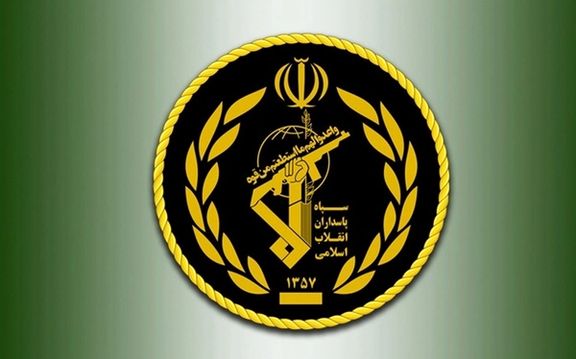
Iran’s parliament has reiterated Tehran’s demand to remove the IRGC from the US list of terrorist entities, as one of the necessary measures to revive the JCPOA nuclear deal.
The spokesman of the parliament's National Security and Foreign Policy Committee, Mahmoud Abbaszadeh-Meshkini, said on Sunday all the Islamic Republic’s demands in the Vienna talks should be met.
"When we say the lifting of all sanctions, it means institutions, companies and individuals; removing the Revolutionary Guard (IRGC) from the list of terrorist organizations is also one of the expectations of the Islamic Republic", he said.
Abbaszadeh-Meshkini added that there are five or six issues left in the Vienna talks, which are important and sensitive priorities for the Islamic Republic, noting that these are the country’s red lines.
Last week, 250 out of 290 members of parliament issued a statement urging President Ebrahim Raisi not to agree to any new nuclear deal without ensuring Iran's demands.
Iran has been insisting to obtain a political guarantee from the United States that it would not renege on a new nuclear agreement, and remove all sanctions imposed on Iran, whether for nuclear or other reasons, such as human rights violations or terrorism. The US has said it will remove only nuclear related sanctions.
Earlier In February, Israel urged the US not to remove the IRGC from its list of terrorist groups, saying the IRGC – which has been designated as a terror group since 2019 -- sponsors Hezbollah, Palestinian Islamic Jihad, and the Houthis.
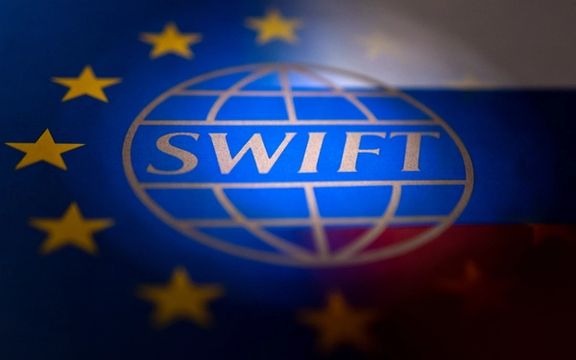
It is hard to predict the impact of Western sanctions on Russia, but there is the example of Iran and its myriad of economic problems triggered by sanctions.
Over the weekend, Western countries moved to expand economic sanctions against Russia that threw tens of thousands of troops with tanks and air power to conquer Ukraine. President Vladimir Putin’s decision was the most serious challenge to Western security perhaps since World War II.
Finally, Western countries agreed to remove several Russian banks from the international banking system SWIFT, an action that was also taken against Iran in the past decade.
While, unlike the Iran case, Russian oil and gas have not been sanctioned, experts agree that banking and other sanctions will impact its energy exports and revenues Moscow depends on.
Western sanctions threaten to substantially weaken the Russian ruble, as well as the health of its banks. They could also trigger high double-digit inflation, a sharp recession and serious unemployment, with their inevitable political consequences. These in combination could turn into a systemic affliction that would be hard for Russia to shake off even after the crisis end in some sort of positive resolution.
Iran’s example is there to see. Although international sanctions were lifted in early 2016 after a nuclear deal was signed and Iran was able to take a deep breath, its international trade and banking were far from normal.

Iranians complained for two years that foreign companies were reluctant to deal with them, banks would not easily cooperate to facilitate trade deals and even ordinary Iranian expats encountered problems in other countries to extend visas, open bank accounts and receive credit lines.
Residual sanctions syndrome
This is what we can call ‘residual sanctions syndrome’. One of the most important aftereffects of international sanctions is loss of credit worthiness in the world financial system, even after sanctions are formally lifted. Institutions are extremely cautious to lend money and most importantly foreign investors avoid a country that experienced Western sanctions.
Again, Iran is a good example. The two-year period from 2016-2018 when most economic sanctions were removed, Iran had a hard time to get major deals and joint ventures. While the country needed tens of billions of dollars in investment, it was able to secure just a few billion dollars.
When Donald Trump became president and criticized the nuclear agreement in 2017, the few investors, such as the French energy giant Total, which had carefully tip-toed into Iran after sanctions had been removed, immediately slowed down investment and eventually withdrew when the US began reimposing sanctions.
Economic sanctions in today’s global economy are also complicated matters and even after they are removed many financial and business actors are not sure what provisions and regulations have been relaxed and how to make decisions without risking legal complications.
One aspect of the residual sanctions syndrome is the persistence of the underlying political factor(s) that led to a sanctions’ regime in the first place. Iran did come to an agreement with the United States and its allies over limiting its nuclear program, but it was still perceived as a pariah state because of its anti-Western foreign policy and its continued overt and covert destabilizing actions in the Middle East.
The psychological aftereffects of sanctions tend to be strong if the sanctioned party is expected to re-exhibit erratic behavior. Would-be investors and trade partners know that there is an inherent risk of doing business with an actor that was once pressured by sanctions and is likely to repeat undesirable actions either driven by aggressive impulses, ideology or militarism.
Even if Putin resolves the Ukraine issue with an agreement and the immediate causes of sanctions are resolved, Russia will lose trustworthiness with business decision makers who simply cannot be sure when the next crisis will come.